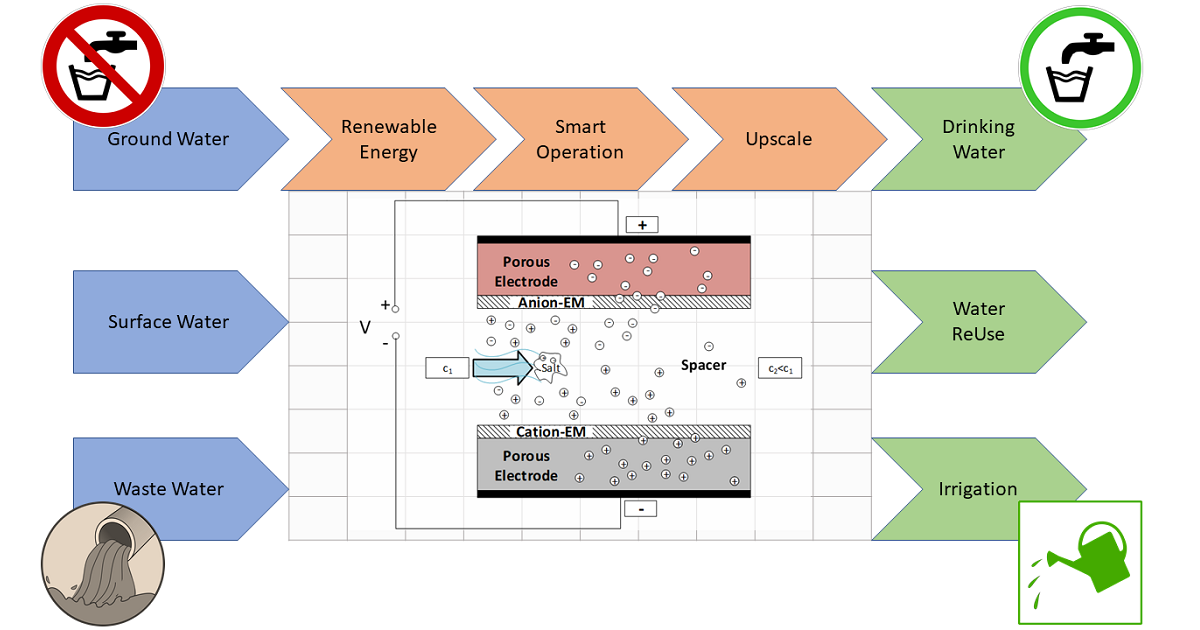- 3.0Impact Factor
- 6.0CiteScore
- 20 daysTime to First Decision
Application of Membrane Capacitive Deionization Technology in Desalination and Wastewater Treatment
This special issue belongs to the section “Wastewater Treatment and Reuse“.
Special Issue Information
Dear Colleagues,
Membrane Capacitive Deionization (MCDI) is an innovative technology that has gained significant attention in recent years for its promising applications in desalination and wastewater treatment, offering an energy-efficient and cost-effective alternative to traditional desalination and water treatment methods. MCDI is an electrochemical ion removal process that utilizes charged porous activated carbon electrodes with high surface areas to remove ions through alternating charge and discharge cycles. The MCDI uses ion-exchange membranes, which are placed on the electrodes to prevent the adsorption of oppositely charged ions, especially during the discharge phase, and thus increases efficiency compared to CDI without membranes.
This Special Issue aims to compile cutting-edge research on Membrane Capacitive Deionization Technology, providing a platform for researchers and practitioners to share their latest findings on the application of MCDI as water treatment technology as well as innovations and challenges in this rapidly evolving field.
We invite original research, review articles, and case studies covering a broad range of topics related to Membrane Capacitive Deionization including but not limited to the following:
- Electrode materials and membrane development;
- Process optimization;
- Energy efficiency;
- Desalination applications;
- Wastewater treatment;
- Pilot and scale-up;
- Environmental impact assessment.
We look forward to receiving your high-quality contributions to this Special Issue, which will undoubtedly contribute to the advancement of Membrane Capacitive Deionization in the field of desalination and wastewater treatment
Prof. Dr. Jan Hoinkis
Guest Editor
Dr. Ulrich Hellriegel
Guest Editor Assistant
Manuscript Submission Information
Manuscripts should be submitted online at www.mdpi.com by registering and logging in to this website. Once you are registered, click here to go to the submission form. Manuscripts can be submitted until the deadline. All submissions that pass pre-check are peer-reviewed. Accepted papers will be published continuously in the journal (as soon as accepted) and will be listed together on the special issue website. Research articles, review articles as well as short communications are invited. For planned papers, a title and short abstract (about 250 words) can be sent to the Editorial Office for assessment.
Submitted manuscripts should not have been published previously, nor be under consideration for publication elsewhere (except conference proceedings papers). All manuscripts are thoroughly refereed through a single-blind peer-review process. A guide for authors and other relevant information for submission of manuscripts is available on the Instructions for Authors page. Water is an international peer-reviewed open access semimonthly journal published by MDPI.
Please visit the Instructions for Authors page before submitting a manuscript. The Article Processing Charge (APC) for publication in this open access journal is 2600 CHF (Swiss Francs). Submitted papers should be well formatted and use good English. Authors may use MDPI's English editing service prior to publication or during author revisions.
Keywords
- process optimization
- application
- pilot trials
- environmental impact assessment
- energy efficiency
- electrode ma-terials
- membrane materials

Benefits of Publishing in a Special Issue
- Ease of navigation: Grouping papers by topic helps scholars navigate broad scope journals more efficiently.
- Greater discoverability: Special Issues support the reach and impact of scientific research. Articles in Special Issues are more discoverable and cited more frequently.
- Expansion of research network: Special Issues facilitate connections among authors, fostering scientific collaborations.
- External promotion: Articles in Special Issues are often promoted through the journal's social media, increasing their visibility.
- e-Book format: Special Issues with more than 10 articles can be published as dedicated e-books, ensuring wide and rapid dissemination.

